
Detritus
Scope & Guideline
Bridging research and practice in environmental science.
Introduction
Aims and Scopes
- Waste Management Strategies and Practices:
The journal covers diverse strategies for effective waste management, including legislative frameworks, operational practices, and community engagement, particularly in the context of circular economy principles. - Recycling and Resource Recovery:
Research on innovative recycling methods and technologies is a core focus, including studies on the recovery of valuable materials from various waste streams, such as electronic waste, plastics, and organic waste. - Environmental Impacts and Assessments:
Detritus emphasizes the importance of life cycle assessments and environmental impact studies related to waste management practices, aiming to provide a comprehensive understanding of the ecological implications of waste treatment. - Social Aspects of Waste Management:
The journal also addresses the socio-economic dimensions of waste management, including the rights of waste pickers, social inclusion, and the role of community participation in sustainable waste practices. - Innovative Technologies and Methods:
Research on emerging technologies and methodologies for waste treatment, including biotechnological approaches, thermochemical processes, and modeling techniques, is prominently featured.
Trending and Emerging
- Circular Economy and Sustainability:
An increasing number of papers focus on the integration of circular economy principles into waste management, emphasizing sustainable practices that enhance resource efficiency and minimize environmental impact. - Innovative Waste Treatment Technologies:
Recent research highlights advancements in waste treatment technologies, such as pyrolysis and anaerobic digestion, which are gaining attention for their potential to convert waste into valuable resources and energy. - Socio-Economic Dimensions of Waste Management:
There is a growing emphasis on the social implications of waste management, including studies that explore the rights of waste pickers, community engagement, and the role of education in promoting sustainable waste practices. - Impact of Legislation and Policy:
The journal increasingly addresses the implications of regulatory frameworks and policies on waste management practices, reflecting the need for alignment between legislation and sustainable waste management strategies. - Microplastics and Environmental Forensics:
Research on microplastics and their environmental impacts is emerging as a significant focus area, highlighting the need for innovative detection methods and remediation strategies in waste management.
Declining or Waning
- Traditional Waste Management Approaches:
There is a noticeable decline in publications focusing on conventional waste management practices, as the discourse shifts towards more innovative and sustainable solutions in line with circular economy principles. - Single-Use Plastics and Their Management:
While plastic waste remains a critical issue, the specific focus on single-use plastics and their management strategies has lessened, potentially overshadowed by broader discussions on plastic recycling and waste minimization. - Incineration and Waste-to-Energy Techniques:
Research on incineration processes and waste-to-energy systems appears to be waning, possibly due to growing concerns over emissions and the pursuit of more sustainable waste management methods.
Similar Journals
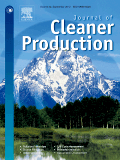
Journal of Cleaner Production
Advancing Sustainable Solutions for a Cleaner TomorrowThe Journal of Cleaner Production, published by Elsevier Science Ltd, is a leading interdisciplinary journal dedicated to the development and dissemination of knowledge on environmental sustainability and cleaner production practices. With an impact factor that reflects its high relevance in the field, the journal is recognized as a Q1 publication in key categories including Environmental Science, Industrial and Manufacturing Engineering, Renewable Energy, and Strategy and Management as of 2023. This prestigious journal has been a platform for groundbreaking research since its inception in 1993 and continues to shape the dialogue around sustainable practices in various sectors. Researchers and professionals across disciplines can access its wealth of insights, which are critical for driving the transition towards more sustainable production and consumption models. The journal’s rigorous peer-review process ensures that only high-quality research is published, making it an essential resource for academics, industry leaders, and policymakers committed to advancing cleaner production methodologies.

Recycling
Connecting researchers to foster environmental innovation.Recycling is a renowned international open access journal published by MDPI that has been dedicated to advancing the field of recycling and waste management since its inception in 2015. With a focus on innovative technologies, management practices, and policy frameworks, this journal serves as a platform for researchers, professionals, and students who are eager to explore sustainable solutions in resource recovery and material efficiency. Based in beautiful Basel, Switzerland, Recycling boasts an impressive impact with a 2023 ranking of Q2 in Management, Monitoring, Policy and Law and Q1 in Materials Science (Miscellaneous), signifying its pivotal role in driving forward-thinking research in these critical areas. The journal is indexed in Scopus, with strong performance metrics highlighting its relevance and quality, such as a rank of #42 in Waste Management and Disposal. As an open access publication, Recycling promotes the dissemination of knowledge, ensuring that groundbreaking research is freely available to a global audience. Whether you are a seasoned researcher or a student eager to contribute to the discourse surrounding sustainable practices, Recycling provides a vital resource for those committed to the future of waste management and environmental sustainability.
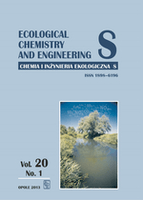
Ecological Chemistry and Engineering S-Chemia I Inzynieria Ekologiczna S
Transforming Knowledge into Ecological ActionEcological Chemistry and Engineering S, a prominent journal in the field of Environmental Chemistry and Engineering, provides a platform for innovative research and critical discussions surrounding ecological solutions and sustainable practices. Published by SCIENDO, this peer-reviewed journal is accessible to researchers and professionals dedicated to advancing our understanding of ecological systems and sustainable engineering practices. With an ISSN of 1898-6196 and an E-ISSN of 2084-4549, the journal has established itself in the academic community, reflected by its Q3 ranking in both Environmental Chemistry and Environmental Engineering categories as of 2023. Covering significant advancements from 2008 to 2024, it serves as an essential resource in advancing knowledge and fostering collaborations within interdisciplinary fields. Despite not offering open access, the journal remains an invaluable resource for researchers and students aiming to contribute to ecological sustainability strategies worldwide.
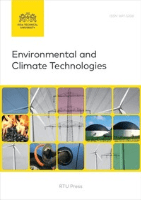
Environmental and Climate Technologies
Exploring Frontiers in Environmental Science and Renewable Energy.Environmental and Climate Technologies is a premier open-access journal dedicated to advancing knowledge in the fields of environmental science and renewable energy. Published by SCIENDO since 2009, this journal plays a crucial role in disseminating innovative research and interdisciplinary studies that address the pressing challenges posed by climate change and sustainable development. With its current positioning in the Q2 quartile for Environmental Science (miscellaneous) and Q3 for Renewable Energy, Sustainability and the Environment, it is recognized for its significant contributions to the academic community, ranking #107 out of 233 in General Environmental Science and #161 out of 270 in Renewable Energy. Hailing from Germany and operating under an open-access policy, Environmental and Climate Technologies ensures that research remains accessible to a global audience, fostering collaboration and discussion among researchers, professionals, and students alike. The journal invites rigorous scientific inquiries and practical solutions that can mitigate the impact of climate-related issues, making it a vital resource for those committed to environmental stewardship and sustainability.

Journal of Material Cycles and Waste Management
Innovating Waste Management for a Greener FutureThe Journal of Material Cycles and Waste Management, published by Springer, stands as a pivotal resource in the fields of material cycles and waste management, addressing critical challenges related to the sustainability of materials and the efficient disposal of waste. With an impact factor reflective of its significant contribution to the scientific community, this journal publishes innovative research that spans a diverse range of topics, from recycling technologies to lifecycle assessment. The journal ranks in the Q2 category for both Mechanics of Materials and Waste Management and Disposal, highlighting its respected position in academia. Operating without open access, the journal seeks to engage researchers, professionals, and students alike, providing a platform to advance knowledge and foster collaboration in the pursuit of sustainable material management solutions. Located in Japan and adhering to a high standard of editorial excellence, the journal is a must-read for those invested in optimizing resource use and minimizing environmental impacts.
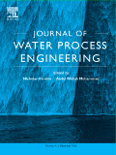
Journal of Water Process Engineering
Elevating Knowledge in Water Science for Global ImpactJournal of Water Process Engineering, published by Elsevier, stands as a leading authority in the interdisciplinary fields of Biotechnology, Process Chemistry and Technology, and Water Science and Technology. With its ISSN 2214-7144, this journal has established itself since its inception in 2014, reaching its convergence year in 2024. Renowned for its high-impact contributions, it holds a prestigious Q1 ranking in 2023 across multiple categories, including Safety, Risk, Reliability and Quality and Waste Management and Disposal. The journal aims to advance knowledge and practice in water processing, addressing global challenges related to water scarcity, environmental safety, and sustainable technology. While the journal does not currently offer open access options, it remains a vital resource for researchers, professionals, and students dedicated to advancing water process engineering and management practices. By disseminating innovative research and methodologies, the Journal of Water Process Engineering plays a crucial role in shaping future technologies and strategies essential for water sustainability.
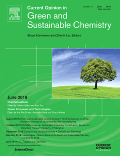
Current Opinion in Green and Sustainable Chemistry
Advancing Sustainable Solutions in ChemistryCurrent Opinion in Green and Sustainable Chemistry, published by Elsevier, is a premier journal dedicated to exploring the rapidly evolving field of green and sustainable practices in chemistry. With an impressive Q1 ranking in multiple categories, including Catalysis, Process Chemistry and Technology, and Waste Management, this journal plays a pivotal role in disseminating innovative research by providing critical insights into sustainable methodologies and their implementation across various industries. The journal aims to gather leading perspectives from experts to facilitate knowledge exchange that drives the global transition towards more sustainable chemical practices. Based in the Netherlands, Current Opinion in Green and Sustainable Chemistry emphasizes high impact, evidenced by its Scopus ranks, notably achieving the 10th percentile in Environmental Science Management, making it indispensable for researchers and professionals keen on advancing sustainable chemistry solutions. This journal offers a blend of open access articles and subscription-based content, ensuring a wide reach and engagement with its audience.
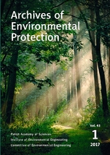
Archives of Environmental Protection
Innovative Insights for a Sustainable FutureArchives of Environmental Protection, published by the Polish Academy of Sciences, is a pivotal journal in the field of Environmental Science. With an ISSN of 2083-4772 and E-ISSN of 2083-4810, this journal serves as a critical platform for disseminating innovative research and comprehensive reviews that address the complexities surrounding environmental issues. As of 2023, it holds a respectable Q3 ranking in Environmental Science, reflecting its relevance and contribution to the academic community, indicated by a Scopus rank of 124 out of 233 in the General Environmental Science category. Although it operates without Open Access, the journal's consistent publication from 2007 to 2024 emphasizes its commitment to advancing knowledge in diverse areas of environmental protection. Researchers, professionals, and students are encouraged to engage deeply with the wealth of insights offered through the rigorous peer-reviewed articles presented in this journal, which strive to foster sustainable practices and environmental stewardship.

ENVIRONMENT DEVELOPMENT AND SUSTAINABILITY
Pioneering Research at the Crossroads of SustainabilityEnvironment, Development and Sustainability is a leading academic journal published by Springer, dedicated to advancing the understanding of the intricate relationships between environmental processes, human development, and sustainable practices. With an ISSN of 1387-585X and an E-ISSN of 1573-2975, this journal provides a platform for high-quality interdisciplinary research that integrates insights from economics, geography, and environmental policy. As of 2023, the journal boasts an impressive impact factor ranking, positioned in the Q2 category for Economics and Econometrics, Q1 for Geography, Planning and Development, and Q2 for Management, Monitoring, Policy and Law. This impressive stature has earned it a significant Scopus ranking, placing it within the top tiers of its field, particularly in Social Sciences and Environmental Science. With a publication timeline extending from 1999 to 2024, the journal serves as a valuable resource for researchers, professionals, and students alike, promoting knowledge exchange and fostering groundbreaking ideas essential for sustainable development. Although it operates under a subscription model, the impact of its articles is profound, making it a pivotal outlet for researchers striving towards sustainability in a rapidly changing world.

Waste Management
Transforming waste challenges into sustainable solutions.Waste Management, published by Pergamon-Elsevier Science Ltd, stands as a premier journal in the field of waste management and disposal, reflecting its esteemed position with an impressive 2023 impact factor and ranking in the Q1 category. This journal is pivotal for researchers, professionals, and students, offering a rich repository of innovative studies and methodologies aimed at addressing the increasingly critical challenges in waste management. With a dedicated focus on advancing knowledge and practice in environmental science, it encompasses a wide array of topics from waste reduction techniques to sustainable disposal strategies. Founded in 1983, Waste Management continues to be at the forefront of academic discourse, providing invaluable insights into both theoretical frameworks and practical applications, thus playing a vital role in shaping the future of waste disposal practices worldwide.